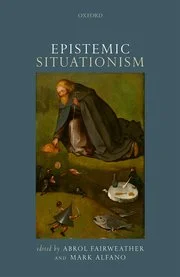Trust is a fascinating phenomenon. You can feel an emotion of trust towards a person, or an institution, or even an artifact. You can engage in a trusting relationship with a person or institution, though not (I think) an artifact. You can put your trust in someone or something, an action that is characteristically but not necessarily accompanied by the emotion of trust.
Tori McGeer, Philip Pettit, and I have written about the ways in which trust can function as a self-fulfilling prophecy -- how putting one's trust in another can lead them to become or at least simulate trustworthiness. Part of how this is meant to work is through various feedback mechanisms between the trustor and the trustee. This presupposes that trust is a dyadic relationship, most naturally understood as a relation between agents.
What I want to explore here are the logical properties of normative trust, by which I mean trust that is functioning as it ought to. In particular, I suggest that normative trust is symmetric (if aNTb, then bNTa), transitive (if aNTb and bNTc, then aNTc), and reflexive (aNTa). In other words, normative trust is an equivalence relation that partitions agents into communities of trust.
Symmetry: Imagine I trust you, and have for a long time. I routinely tell you my secrets, my hopes, my fears. I make myself vulnerable to you in various ways, but it rarely crosses my mind that you might betray me -- and when it does, the thought doesn't worry me. You've proven trustworthy in a variety of circumstances, so my trust is at this point well-founded. This aspect of our relationship is mutual knowledge between us. Yet you don't trust me. In fact, you explicitly distrust me. You refuse to tell me our secrets, to reveal your hopes and fears, to make yourself vulnerable to me. It often crosses your mind that I might betray your confidence, and when it does, you're motivated to prevent that.
This is certainly a possible kind of relationship. It probably characterizes many relationships between child and caregiver. It may also characterize certain kinds of one-sided friendships. It might characterize relationships between addicts and those who take care of them. It seems pretty clearly to characterize certain kinds of client-therapist relationships. When I suggest that normative trust is symmetric, then, I'm not claiming that this kind of relationship is impossible. What I do think, though, is that, to the extent that symmetry breaks down, trust is not functioning as it ought to. A fully functional trusting relationship is one in which both parties trust each other. In other words, normative trust is symmetric.
Transitivity: Reliance, being an externalist concept, is descriptively transitive. If you rely on the pilot to get you from Laguardia airport to London Heathrow, and the pilot relies on the ground crew to maintain the plane in working order, then you rely on the ground crew whether you know it or not, whether you like it or not. Trust, being an internalist concept, is clearly not descriptively transitive. You can trust someone who trusts someone you don't trust or even distrust. But when you do, things have gone wrong; trust is not functioning as it ought.
Suppose I trust you with my secrets, and you trust your sibling with your secrets, but I explicitly distrust your sibling. Things are not as they ought to be. For instance, if I find out that you tell your sibling everything, I'm going to be motivated to avoid telling you things I don't trust her with. Or suppose you trust me to complete a task, and that I sub-contract out a part of that task to someone you distrust. Again, if you find out that I've done this, you'll most likely withdraw your trust from me -- at least in this instance and perhaps more generally. You might conclude that I lack good judgment about whom to trust. In other words, normative trust is transitive.
Reflexivity: Finally, normative trust is reflexive. You ought to trust yourself. There is a remarkable near-consensus on this. Pasnau argues that self-trust explains how we should react to peer disagreement. Lehrer argues that self-trust grounds reason, wisdom, and knowledge. Govier argues that self-trust grounds autonomy and self-respect. Goldberg argues that self-trust is a good model for trust of others. Given the transitivity of normative trust, we see one reason why the relation should also be reflexive: if you trust me but I don't trust myself, your trust is misplaced (or my mistrust is misplaced).















Mark Alfano. Cambridge University Press (2013).